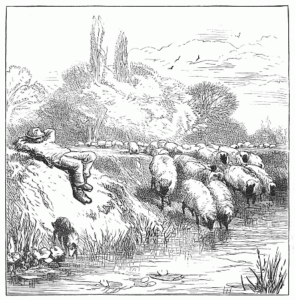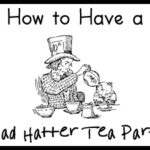
Welcome to Homeschool Story Time: Week 41.
In today’s story, two orphan boys are hired to be shepherds, however, each boy handles the position in a unique way.
The results are different for the boys after they complete eight years of employment.
How did the boys’ choices impact their outcomes?
Find out.
The Lazy Shepherd
by Uncle Charles
Some years ago in Scotland, two boys, whose names were Henry Bright and John Yorner, were left orphans by the death of parents. Mr. Donald, a good man, who had nine or ten thousand sheep, and employed many shepherds, took both these boys into his employ.
“Now, boys,” said he, “a shepherd’s life may be barren or fruitful, lazy or active, just as you choose to make it. In pleasant weather, while you are tending the sheep, if you have good dogs to help you, you can, if you choose, find leisure for reading and for study, and at the same time not neglect your proper duties.
“If you want books, come to my house, and I will lend them to you. You have eight years to serve before you are twenty-one; and in that time you can fit yourselves for employments that will yield you much more than the work of a shepherd.”
Henry Bright first suited himself to a good dog, and taught him so well, that Plato—such was the dog’s name—soon took almost the whole care of a hundred sheep that Henry had to look after. The lad would take a seat under the shelter of some rock, and read and study, while Plato would lie at his feet, or run round to see that no sheep or lamb was straying too far from the pasture-ground.

But John Yorner was lazy, and did not care for books. He would not take the trouble even to teach a dog his duties. He would lie on a bank in the sun, with his hands clasped above his head, and there sleep away the long hours before dinner. Often his sheep would stray away and get lost; so that Mr. Donald once said to him, “I fear you are not fit even for a shepherd, John.”
You may easily guess what the result was at the end of eight years. John Yorner was a shepherd still: he had not been promoted to any better employment. He loved idleness too well. One must be diligent if he would be faithful and succeed.
As for Henry, he applied himself to the study of arithmetic, and became so skilled in that branch of study, that, before he was nineteen, his services were wanted by a large mercantile house in Glasgow. There he made himself so useful, that his success became no longer a matter of doubt.
Oh the days of youth, how precious they are! Do not be like the lazy shepherd, my little friends!
* * *
Bookmark or pin this post so you can find it again.







